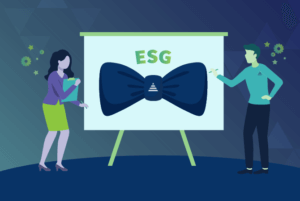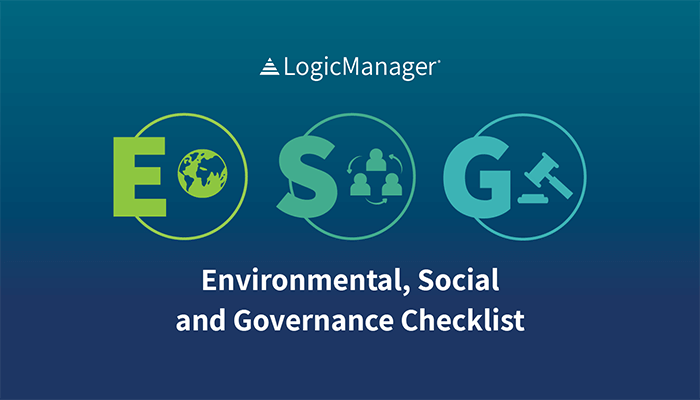ESG Policy Management Software
Companies are being pressured by the See-Through Economy to determine how they can justify ESG status and sustain their disclosures from the SEC’s scrutiny on misstatements. But many people are struggling to find a way to achieve ESG and sustainability in a meaningful way (that is, going beyond saying “we recycle”). Having a strong Enterprise Risk Management program in place helps you inherently satisfy ESG requirements by promoting good governance in your everyday activities.
This application can be achieved through:
Why Taking a Risk-Based Approach to ESG is Important:
LogicManager’s ESG Software
- LogicManager offers a full risk management and governance solution to empower all of your sustainability management needs:
- Risk assessment templates, tasks to conduct those risk assessments and mechanisms to formalize your policies and track them systemically.
- Testing and metrics collection to automatically prompt for the necessary monitoring needed on an ongoing basis (and then automatically generate the evidence that you are doing what you say you are doing).
- Control collection and documentation happens inherently as you work within LogicManager’s taxonomy, building an audit trail along the way.
- Issues & findings tracking to ensure you have a formalized process in place for identifying and remediating issues should they arise.
- Automated ESG disclosure management and sustainability reporting to ensure that your organization is on track with standards like the CDP, CDSB, GRI, SBTi, TCFD, PRI and WEF Stakeholder Capitalism Metrics.
- Gain the ability to integrate your risk management program with any other enterprise systems to help support and gather the evidence you need to prove that ESG goals have been achieved.
- Save time and resources using our taxonomy-driven AI tools like the Content Hub and our One-Click Compliance tool. Simply identify a relevant law, standard or framework and LogicManager will automatically identify ways in which you’re already in compliance.
- Tools for Third-Party ESG Management that allow you to track and manage vendor diversity, from ensuring supplier sustainability to staying on top of government compliance needs and more.
- The Policy Portal makes it easy to view all of the policies you have in one place that are supporting your alignment with any ESG framework.
- Plus, leverage our Risk Maturity Model (RMM) for a way of actually measuring how strong your risk management program is, and therefore how strong your ESG program is.
What is Environmental, Social and Corporate Governance? (ESG)
Environmental, social and governance (ESG) criteria are a set of standards for a company’s operations that socially conscious investors use to screen potential investments.
- Environmental criteria consider factors such as carbon emissions, water and waste management, raw material sourcing and climate change vulnerability and mitigations.
- Social criteria examine diversity, equity, and inclusion, labor management, data privacy and security, and community relations where it operates.
- Governance criteria deals with a company’s leadership, executive pay, audits, internal controls, board governance, business ethics, intellectual property protection and shareholder rights.
Complete Guide: What is ESG?
Why is ESG so important?
As investors place an increasing amount of priority on ESG, the more material this information has become to a firm’s value and financial picture. Company disclosures have come under recent scrutiny with a governance and control framework advocated to provide assurance for ESG reporting and sustainability management controls.
On March 3, 2021, the SEC Division of Examinations issued its priorities for 2021, which indicated a renewed focus on ESG matters, including whether examined firms’ practices match their website and 10-K disclosures. Disclosures and statements of an organization’s ESG principles and reporting programs require implementation of an efficient and unified evidence-based way to track, measure, attest and report on their ESG goals, initiatives and results.
Recent findings provide evidence that companies highly rated in terms of their Environmental, Social, and Governance (ESG) score report higher excess returns and lower volatility. This is supported by the assumption that ESG factors are considered important by market agents as good proxy for firms’ financial soundness in risk management.
Find Out More: Why Is ESG Important?
ESG Risks
The See-Through Economy
Today, we exist in a world where consumers and investors want to align themselves with companies whose values they agree with. If you claim that you have a high ESG performance and then actually aren’t, this is a huge reputation risk and something that your customers and investors will take note of.
Negligence
In your 10K and 10Q, there is a risk that the person making the disclosure isn’t actually aware of all of the risks they are claiming. Without ensuring that this person has confidence in what they are disclosing, even if they don’t know, they are still signing off on it and will face the penalties of negligence.
Fraud
If you misrepresent your company with ESG data, as an ESG company to investors then you will get more investors, and your stock will go up artificially. This is fraud, and you run the risk of fines, penalties, lawsuits or worse.
Customer loss
If you can’t define meaningful ways that your company is ESG, for many people, it’s difficult to support your business. This can lead to a loss of consumer and investor buy-in.
Importance of ERM for ESG
Recent findings show that by having good ERM practices, you are a company with good ESG practices.
If you have a strong risk management program, you inherently have ESG management, ESG Data and ESG reporting embedded into every aspect of your company. The more you are committed to making better business decisions and getting strong business results, the more you align your organization with the standards of ESG. Simply put: to have a strong risk management program, you need to be a responsible company.
An effective ESG program requires collaboration, insight and metrics from across the organization to work towards common goals as a team. Many organizations start with an ESG risk and readiness assessment. Another way to measure yourself against these best practices is through our Risk Maturity Model, which has proven to help companies achieve up to 25% higher market valuations. LogicManager provides certification and evidence-based statements that can be disclosed with confidence on SEC documentation.
Request a DemoLearn How LogicManager’s ESG Policy Management Software Can Transform Your Risk Management Program
Speak with one of our risk specialists today and discover how you can empower your organization to uphold their reputation, anticipate what’s ahead, and improve business performance through strong governance.




